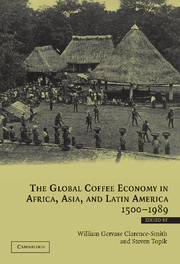Book contents
- Frontmatter
- Contents
- World coffee production
- Guatemala and Mexico
- Nicaragua and Costa Rica
- Brazil
- Cameroon
- Madagascar and Réunion
- East Africa
- Red Sea
- Ceylon and South India
- Java
- Introduction: Coffee and Global Development
- I ORIGINS OF THE WORLD COFFEE ECONOMY
- II PEASANTS: RACE, GENDER, AND PROPERTY
- III COFFEE, POLITICS, AND STATE BUILDING
- Conclusion: New Propositions and a Research Agenda
- Appendix: Historical Statistics of Coffee Production and Trade from 1700 to 1960
- Index
Introduction: Coffee and Global Development
Published online by Cambridge University Press: 01 September 2009
- Frontmatter
- Contents
- World coffee production
- Guatemala and Mexico
- Nicaragua and Costa Rica
- Brazil
- Cameroon
- Madagascar and Réunion
- East Africa
- Red Sea
- Ceylon and South India
- Java
- Introduction: Coffee and Global Development
- I ORIGINS OF THE WORLD COFFEE ECONOMY
- II PEASANTS: RACE, GENDER, AND PROPERTY
- III COFFEE, POLITICS, AND STATE BUILDING
- Conclusion: New Propositions and a Research Agenda
- Appendix: Historical Statistics of Coffee Production and Trade from 1700 to 1960
- Index
Summary
That cup of coffee you sip at your breakfast table, desk, or café comes from far away. It was grown in Brazil, Colombia, Vietnam, the Ivory Coast, or one of a hundred other coffee-producing lands on five continents. It is a palpable and long-standing manifestation of globalization. For 500 years coffee has been grown in tropical countries for consumption in temperate regions, linking peoples of different lands and continents by trade, investment, immigration, conquest, and cultural and religious diffusion. There is a world of history in your cup.
An increasingly sophisticated study of world history is a means of understanding these processes. We have thus brought together scholars from nine countries, who cover coffee markets and societies over the last five centuries in fourteen countries on four continents and across the Indian and Pacific oceans, with a special emphasis on the nineteenth and early twentieth centuries. We analyze a wide variety of issues, related to economic, political, and cultural development, to see how they have played out over the last centuries in different parts of the globe, under different political arrangements: the creation and function of commodity, labor, and financial markets; the role of race, ethnicity, gender, and class in the formation of coffee societies; the interaction between technology and ecology; and the impact of colonial powers, nationalist regimes, and the forces of the world economy in the forging of economic development and political democracy.
- Type
- Chapter
- Information
- Publisher: Cambridge University PressPrint publication year: 2003
- 3
- Cited by



